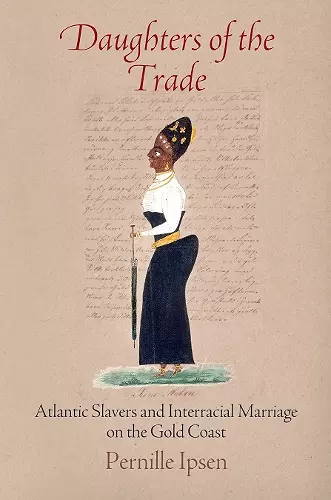Daughters of the Trade
Atlantic Slavers and Interracial Marriage on the Gold Coast
Format:Paperback
Publisher:University of Pennsylvania Press
Published:7th Dec '16
Currently unavailable, and unfortunately no date known when it will be back

Severine Brock's first language was Ga, yet it was not surprising when, in 1842, she married Edward Carstensen. He was the last governor of Christiansborg, the fort that, in the eighteenth century, had been the center of Danish slave trading in West Africa. She was the descendant of Ga-speaking women who had married Danish merchants and traders. Their marriage would have been familiar to Gold Coast traders going back nearly 150 years. In Daughters of the Trade, Pernille Ipsen follows five generations of marriages between African women and Danish men, revealing how interracial marriage created a Euro-African hybrid culture specifically adapted to the Atlantic slave trade.
Although interracial marriage was prohibited in European colonies throughout the Atlantic world, in Gold Coast slave-trading towns it became a recognized and respected custom. Cassare, or "keeping house," gave European men the support of African women and their kin, which was essential for their survival and success, while African families made alliances with European traders and secured the legitimacy of their offspring by making the unions official.
For many years, Euro-African families lived in close proximity to the violence of the slave trade. Sheltered by their Danish names and connections, they grew wealthy and influential. But their powerful position on the Gold Coast did not extend to the broader Atlantic world, where the link between blackness and slavery grew stronger, and where Euro-African descent did not guarantee privilege. By the time Severine Brock married Edward Carstensen, their world had changed. Daughters of the Trade uncovers the vital role interracial marriage played in the coastal slave trade, the production of racial difference, and the increasing stratification of the early modern Atlantic world.
"An important contribution that will appeal to a broad audience of scholars who have an interest in the history of entanglements, Africa, Europe, the Atlantic, gender, power relations, race and society."—Itinerario
"A carefully researched and illuminating addition to scholarship on Danish colonial history, the study of the Atlantic slave trade and its impacts on African history, and scholarship on the making of the Atlantic world."—American Historical Review
"Ipsen has opened a previously closed window. In the process, she has provided us with an analysis of interracial marriage in the Atlantic that bridges the early modern and modern, as well as the precolonial and colonial, with significant implications for interpretations of better known cases in the Dutch, French, and British Atlantic."—African Studies Review
"Ipsen breaks welcome new ground. . . . This is an excellent, very readable study that is suitable for upper-level undergraduate and graduate students, and courses on the history of gender, sexuality and racial dynamics in the Atlantic world."—Slavery & Abolition
"Daughters of the Trade is an important contribution to a growing body of literature on interracial marriage and the mixed-race communities that emerged on the African coast in the era of the Atlantic slave trade. Scholars and students of the Atlantic world, slavery and abolition, and West African slave-trade ports will find a great deal to consider in this work, especially in terms of methodology and analytical approach."—William & Mary Quarterly
"In this important and engaging study, Pernille Ipsen brings vividly to life the mixed-race communities that flourished around Danish forts on the West African coast. Her accessible work is full of surprises and adds a human dimension to the often abstract history of the slave trade, and the importance and originality of her research has implications far beyond West Africa. A first-rate achievement."—Randy J. Sparks, author of Where the Negroes Are Masters: An African Port in the Era of the Slave Trade
"Daughters of the Trade represents the best of recent work that seeks to problematize the formal conjugal relationships between European men and African and Euro-African women that were such a prominent feature of the trading cities and forts of coastal West Africa during the era of the Atlantic slave trade. In elucidating the centrality of intimate relations in the trade and African colonialism, Ipsen's graceful and intellectually lucid book will almost certainly become the benchmark monograph on the subject."—Emily Clark, author of The Strange History of the American Quadroon
"In this carefully researched and beautifully written study, Pernille Ipsen uses interracial marriages on the West African coast to illustrate the very local construction of race and racial consciousness in the Atlantic world. African women are at the heart of this story—as wives, as traders, as mothers, and as daughters. Women's lives have too often fallen to the margins, and Daughters of the Trade forcefully argues that African women played crucial, if complicated, roles in the development of the Atlantic world."—Jennifer Morgan, New York University
ISBN: 9780812223958
Dimensions: unknown
Weight: unknown
288 pages